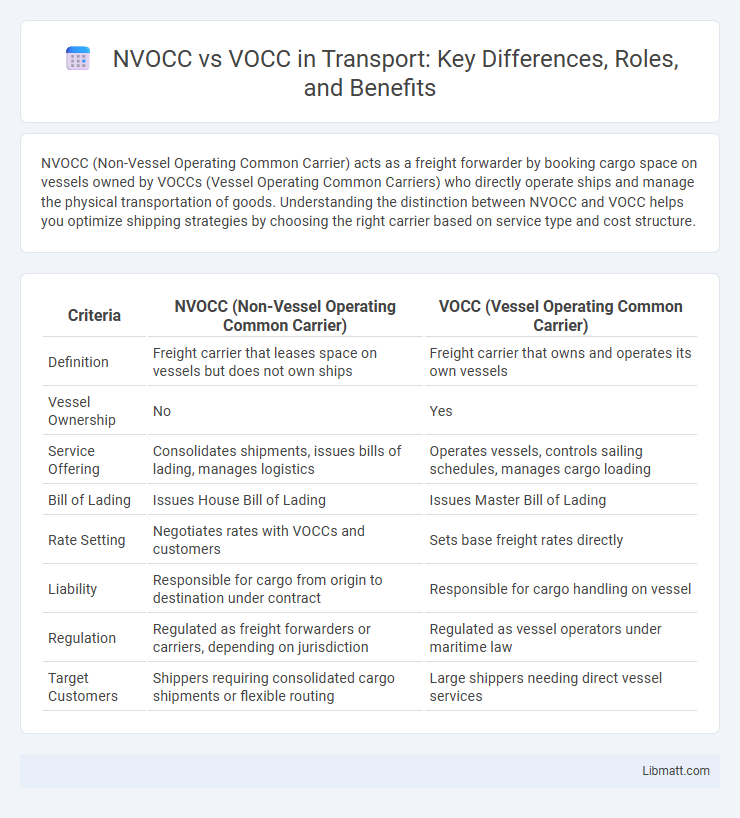NVOCC (Non-Vessel Operating Common Carrier) acts as a freight forwarder by booking cargo space on vessels owned by VOCCs (Vessel Operating Common Carriers) who directly operate ships and manage the physical transportation of goods. Understanding the distinction between NVOCC and VOCC helps you optimize shipping strategies by choosing the right carrier based on service type and cost structure.
Table of Comparison
| Criteria | NVOCC (Non-Vessel Operating Common Carrier) | VOCC (Vessel Operating Common Carrier) |
|---|---|---|
| Definition | Freight carrier that leases space on vessels but does not own ships | Freight carrier that owns and operates its own vessels |
| Vessel Ownership | No | Yes |
| Service Offering | Consolidates shipments, issues bills of lading, manages logistics | Operates vessels, controls sailing schedules, manages cargo loading |
| Bill of Lading | Issues House Bill of Lading | Issues Master Bill of Lading |
| Rate Setting | Negotiates rates with VOCCs and customers | Sets base freight rates directly |
| Liability | Responsible for cargo from origin to destination under contract | Responsible for cargo handling on vessel |
| Regulation | Regulated as freight forwarders or carriers, depending on jurisdiction | Regulated as vessel operators under maritime law |
| Target Customers | Shippers requiring consolidated cargo shipments or flexible routing | Large shippers needing direct vessel services |
Introduction to NVOCC and VOCC
NVOCC (Non-Vessel Operating Common Carrier) acts as a freight forwarder by consolidating shipments and issuing its own bills of lading without operating vessels, while VOCC (Vessel Operating Common Carrier) owns and operates ships transporting cargo directly across international routes. You rely on NVOCC for flexible, multi-carrier shipping solutions and VOCC for direct vessel space and carrier services. Understanding the distinction helps optimize your supply chain management and shipping efficiency.
Definition of NVOCC
An NVOCC (Non-Vessel Operating Common Carrier) is a company that arranges ocean freight transportation without operating the vessels themselves, acting as an intermediary between shippers and VOCCs (Vessel Operating Common Carriers). Unlike VOCCs, which own and operate ships, NVOCCs issue their own bills of lading and consolidate shipments from multiple customers to optimize cargo space. Your choice between NVOCC and VOCC depends on whether you need flexible shipping solutions or direct carrier services.
Definition of VOCC
VOCC, or Vessel Operating Common Carrier, is a company that owns and operates ships, providing ocean transportation services directly to shippers and consignees. Unlike NVOCCs (Non-Vessel Operating Common Carriers), which do not own the vessels and rely on VOCCs for shipping capacity, VOCCs manage their own fleets and control the entire shipping process from port to port. Understanding the role of a VOCC helps your business choose the right carrier type based on ownership and operational control in ocean freight logistics.
Key Differences Between NVOCC and VOCC
NVOCCs (Non-Vessel Operating Common Carriers) do not own ships but provide ocean freight services by leasing space from VOCCs (Vessel Operating Common Carriers), who own and operate the vessels. VOCCs manage vessel operations and cargo loading directly, whereas NVOCCs act as intermediaries offering additional services like consolidation and documentation. Pricing structures differ, with VOCCs setting base freight rates and NVOCCs often bundling services to offer flexible pricing options.
Legal and Regulatory Distinctions
NVOCCs (Non-Vessel Operating Common Carriers) operate under different legal frameworks compared to VOCCs (Vessel Operating Common Carriers), as NVOCCs do not own vessels but issue their own bills of lading and are regulated primarily under international shipping laws such as the Ocean Shipping Reform Act (OSRA) in the U.S. VOCCs own and operate ships, subjecting them to stricter safety, environmental, and crew regulations under maritime law. Your choice between NVOCC and VOCC impacts liability, documentation, and compliance responsibilities across global shipping routes.
Roles and Responsibilities in Shipping
NVOCCs (Non-Vessel Operating Common Carriers) act as intermediaries by booking cargo space and issuing their own bills of lading without owning vessels, managing freight consolidation, and customer documentation. VOCCs (Vessel Operating Common Carriers) own and operate the ships, handling vessel scheduling, cargo stowage, and direct transport responsibilities. Understanding these distinct roles helps you optimize shipping logistics by selecting the appropriate carrier type for your cargo needs.
Documentation Handled by NVOCC vs VOCC
NVOCCs (Non-Vessel Operating Common Carriers) manage their own documentation, issuing House Bills of Lading (HBL) to shippers while coordinating with VOCCs for the Master Bills of Lading (MBL). VOCCs (Vessel Operating Common Carriers) handle the primary ocean transport documentation and issue the MBL, which serves as the official contract for carriage on their vessels. Understanding this distinction helps you navigate the shipping process more effectively and ensures proper handling of your cargo documentation.
Advantages of Choosing NVOCC
NVOCCs offer greater flexibility and personalized customer service compared to VOCCs due to their ability to consolidate cargo from multiple shippers, reducing shipping costs and improving efficiency. They provide more routing options and can negotiate better rates with carriers, enhancing your shipping strategy. This makes NVOCCs ideal for businesses seeking tailored logistics solutions and cost-effective freight forwarding.
Benefits of Shipping with VOCC
Shipping with a Vessel Operating Common Carrier (VOCC) offers direct control over vessel schedules and cargo handling, ensuring reliable transit times and enhanced operational efficiency. VOCCs provide comprehensive carrier liability and streamlined documentation, reducing delays and improving cargo safety throughout the shipping process. Utilizing VOCC services often results in cost-effective rates and integrated door-to-door logistics solutions, benefiting shippers with predictable delivery and optimized supply chain management.
Conclusion: Choosing Between NVOCC and VOCC
Choosing between NVOCC and VOCC depends on your specific shipping needs, budget, and service preferences. VOCCs operate their own vessels, providing direct control over shipping schedules and capacities, while NVOCCs act as intermediaries, consolidating cargo and offering flexible routing options. Your decision should prioritize cost-efficiency, shipment volume, and the desired level of control over the logistics process.
NVOCC vs VOCC Infographic

 libmatt.com
libmatt.com